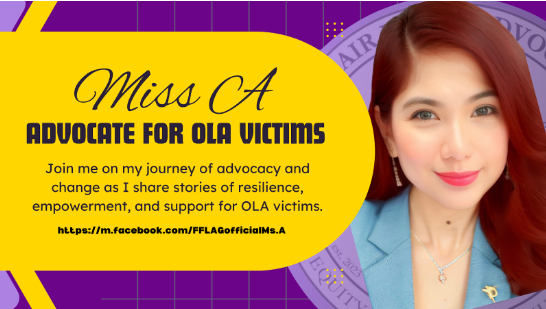Understanding the Landscape of Online Lending Applications/Platforms in the Philippines by Miss Alexa

Introduction:
Online lending apps have experienced significant growth in the Philippines, driven by the increasing demand for accessible and convenient financial services. These platforms offer quick and easy access to credit, often with minimal documentation requirements and fast approval processes. While these have contributed to financial inclusion by providing access to credit for underserved communities and individuals without traditional banking relationships, their rapid expansion has also raised concerns about predatory lending practices, regulatory oversight, data privacy, and consumer protection.
Impact of OLAs: Financial Inclusion: OLAs have played a crucial role in expanding financial inclusion by reaching segments of the population that are underserved by traditional banks. They have provided a lifeline for individuals and small businesses that have limited access to formal financial services.
Convenience: The digital nature of OLAs has revolutionized the lending process, offering convenience and efficiency. Borrowers can apply for loans online, receive quick approvals, and access funds electronically, eliminating the need for physical visits to banks or financial institutions.
Economic Growth: OLAs have contributed to economic growth by providing capital to small businesses and entrepreneurs. They have facilitated entrepreneurship and economic activity, particularly in sectors that were previously underserved by traditional lenders.
Challenges and Issues: Predatory Lending Practices: Some OLAs have been criticized for engaging in predatory lending practices, such as high-interest rates, hidden fees, and aggressive debt collection tactics. These practices can trap borrowers in a cycle of debt and financial hardship.
Regulatory Gaps: The rapid growth of OLAs has outpaced regulatory frameworks, leading to gaps in oversight and consumer protection. This has allowed some OLAs to operate without proper scrutiny, posing risks to consumers.
Data Privacy and Security: OLAs collect and store sensitive personal and financial information, raising concerns about data privacy and security breaches. There have been cases of data breaches and unauthorized access to consumer information, highlighting the need for robust data protection measures.
Deceptive Advertisements and Harassment Tactics: False Promises: Some OLAs use deceptive advertising tactics to lure borrowers with promises of quick and easy loans without fully disclosing the terms and conditions. This can lead to misunderstandings and misinterpretations of the actual cost of borrowing.
Harassment: There have been reports of OLAs engaging in aggressive debt collection practices, including incessant calls, text messages, and emails to borrowers, often using threatening language or false claims of legal action. This harassment can have serious psychological and emotional effects on borrowers, leading to stress and anxiety.
Debt Shaming: OLAs may resort to debt shaming tactics, publicly shaming borrowers who are unable to repay their loans on time. This can lead to social stigma and embarrassment for borrowers, further exacerbating their financial difficulties.
Excessive Contact: OLAs may engage in persistent and excessive contact with borrowers, including frequent phone calls, text messages, emails, and letters. This bombardment of communication can be overwhelming and distressing for borrowers, especially if they are unable to repay their loans.
Threats and Intimidation: OLAs may use threats or intimidating language to coerce borrowers into making payments. This can include threats of legal action, arrest, or public embarrassment. Such tactics are designed to instill fear in borrowers and compel them to comply with the OLAs demands.
False Claims: OLAs may make false or misleading statements to borrowers in an attempt to pressure them into repaying their loans. This can include falsely claiming that legal action has been initiated against the borrower, misrepresenting the consequences of non-payment, or falsely stating that the borrower's personal information will be publicly disclosed.
Privacy Violations: OLAs may violate borrowers' privacy by disclosing their debt status to third parties, such as family members, friends, or employers, without their consent. This breach of privacy can lead to embarrassment, social stigma, and strained relationships.
Psychological Impact: Harassment by OLAs can have significant psychological effects on borrowers, including stress, anxiety, depression, and feelings of helplessness. The constant pressure and fear of repercussions can take a toll on borrowers' mental health and well-being.
Continued Harassment Despite Payment Arrangements: In some cases, OLAs may continue to harass borrowers even after they have made payment arrangements or are in the process of repaying their loans. This can create a cycle of harassment that persists regardless of the borrower's efforts to resolve the situation.
Conclusion: OLAs have brought significant benefits to the Philippines by expanding access to credit and promoting financial inclusion. However, there are challenges and risks associated with their rapid growth, including predatory lending practices, regulatory gaps, and data privacy concerns. Strengthening regulatory oversight, enhancing consumer protection measures, and promoting ethical lending practices are crucial to ensure the responsible and a sustainable growth of OLAs in the Philippines.